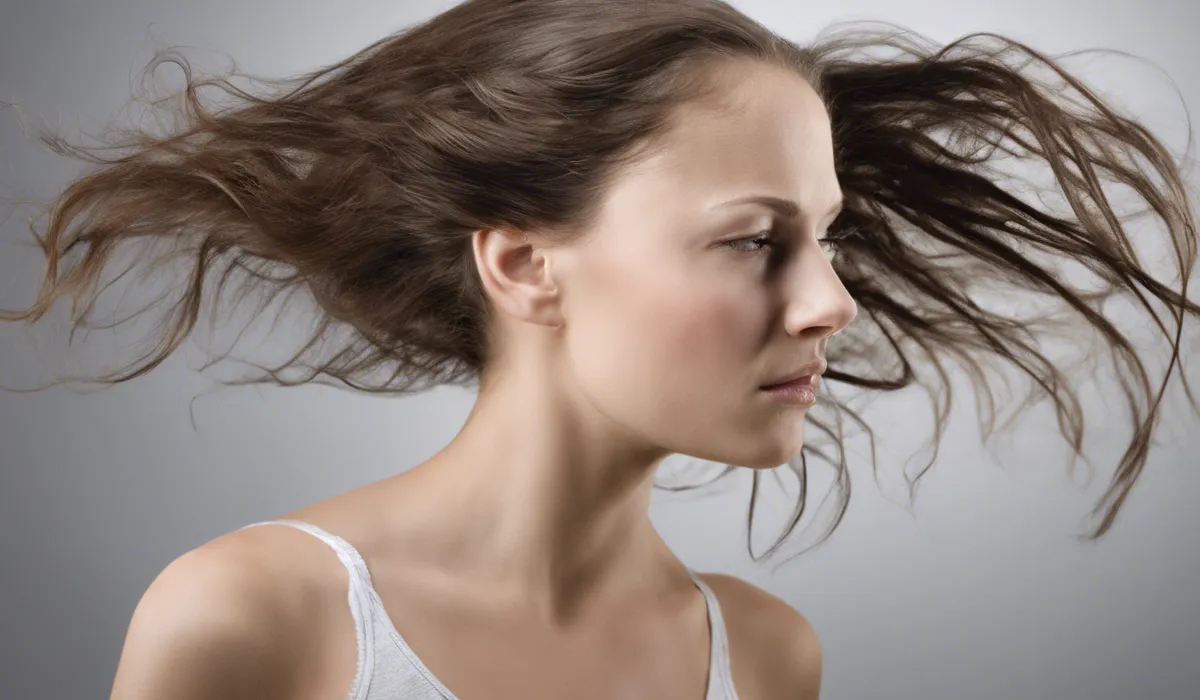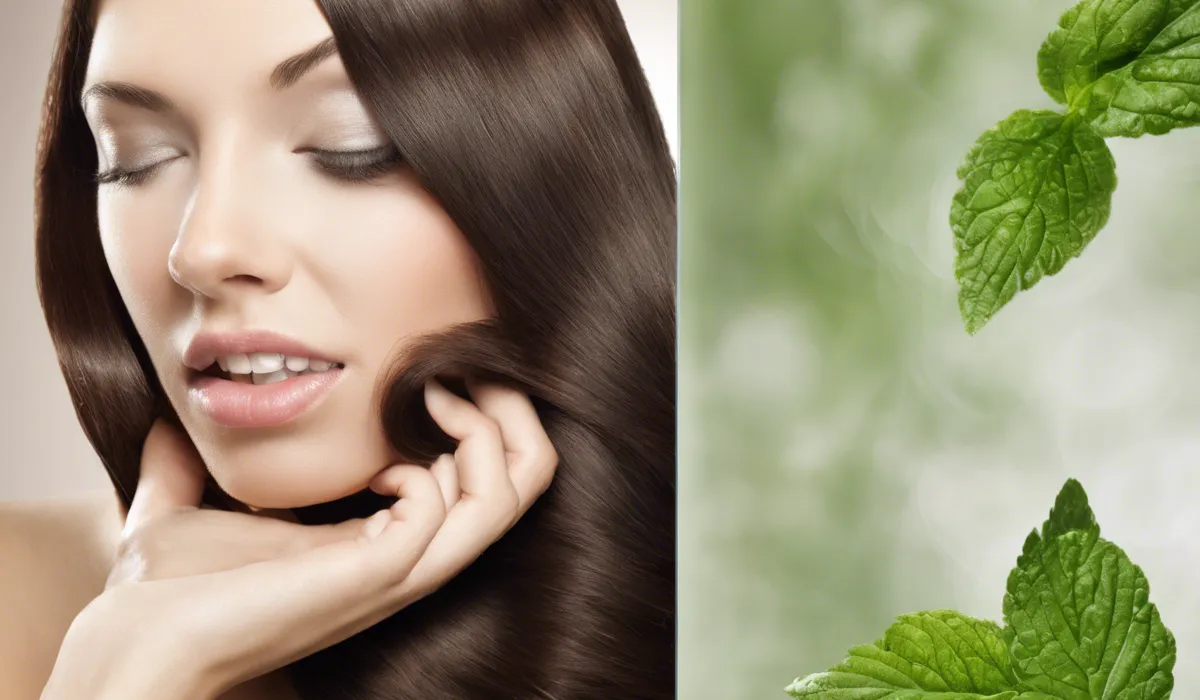To remove mildew smell from hair, wash it with a mixture of water and vinegar (1:1 ratio), focusing on the scalp. Rinse thoroughly, then shampoo with an anti-fungal or clarifying product. Finish with a scented conditioner to mask any remaining odor.
Causes of Mildew Smell in Hair

Trapped Moisture: A Culprit of Funky Odors
One of the primary reasons for a mildew smell in hair is trapped moisture. Hair that isn’t dried thoroughly after washing can become a breeding ground for bacteria and mildew, leading to unpleasant odors.
It’s crucial to ensure hair is completely dry, particularly at the roots where the hair is denser and takes longer to dry.
Dangers of Lingering Dampness
Leaving hair wet for extended periods, such as after swimming or showering, can also contribute to a mildew smell.
If you have a habit of tying up wet hair or wearing a hat over damp locks, you may want to reconsider. The lack of airflow can prevent hair from drying properly, creating a habitat for mildew to thrive.
Product Build-Up
Another common cause is the build-up of oils and hair products. Heavy use of conditioners, gels, and sprays can leave residue that not only weighs down your hair but can also trap moisture against the scalp.
This can lead to a musty smell if not regularly cleansed away.
Infrequent Cleansing
Infrequent washing and poor scalp hygiene can lead to a mildew smell in hair. An unwashed scalp can accumulate sweat, oils, and dead skin cells, providing the perfect environment for odor-causing bacteria and fungi.
Determining the right washing frequency for your hair type is essential to keep it fresh and clean.
Fungal Infections
Fungal infections, such as those caused by Malassezia species, can be at the root of a musty hair odor.
These organisms thrive in warm, moist environments and can produce a distinctive mildew-like smell. Recognizing and treating these infections is vital for maintaining a healthy scalp and fresh-smelling hair.
Natural Remedies and Home Solutions

Vinegar Rinse: A Natural Deodorizer
Vinegar, particularly apple cider or white vinegar, is an excellent home remedy for neutralizing odors in hair.
The acidity of vinegar helps to balance the scalp’s pH and remove odor-causing bacteria. Mix water and vinegar in a 1:1 ratio, apply to the scalp, and rinse thoroughly before shampooing.
Baking Soda
Baking soda is known for its ability to absorb smells. Creating a paste with water and applying it to your hair can help eliminate the mildew smell. It’s a gentle, non-abrasive option that can also help to cleanse the hair of residue build-up.
Tea Tree Oil
Tea tree oil is celebrated for its antifungal properties, making it an effective solution for treating scalp infections that cause a mildew smell.
Adding a few drops to your shampoo or diluting it with a carrier oil for a scalp massage can help to combat fungal growth and keep your hair smelling fresh.
Lemon Juice Rinse
Lemon juice, with its acidic nature, can act as a natural cleanser for your hair. A rinse made from freshly squeezed lemon juice can help remove lingering odors and leave your hair with a clean, fresh scent.
It’s also useful for cutting through product residue that may be contributing to the smell.
Proper Drying Techniques
Implementing proper drying techniques is crucial to prevent a mildew smell in hair. Tips such as gently towel-drying, using a blow dryer on a low heat setting, and making sure your hair is thoroughly dry before styling can make a significant difference in keeping your hair odor-free.
Preventative Measures and Hair Care Routine Changes

Washing Frequency: Striking the Perfect Balance
Finding the right balance in washing frequency is key to maintaining scalp health and preventing mildew smell.
Washing too often can strip natural oils, while washing too infrequently can lead to build-up. Listen to your scalp’s needs and adjust your routine accordingly.
Selecting Hair Products: Less is Often More
Choosing the right hair products is essential to avoid contributing to build-up that can trap moisture and cause odors. Look for lightweight, non-comedogenic products that wash out easily and don’t leave heavy residue behind.
Protective Hairstyles: Keeping Hair Dry and Styled
Protective hairstyles can help prevent prolonged dampness by keeping hair secure and away from moisture-rich environments like rain or humidity. Styles like braids and buns can be both fashionable and functional in wet conditions.
Anti-Fungal Shampoos
Incorporating anti-fungal shampoos into your routine can be beneficial if you’re prone to scalp infections.
These specialized shampoos contain ingredients that target the fungi responsible for mildew smells, helping to keep your scalp clean and odor-free.
Cleaning Hair Tools
Regular cleaning of hair tools and accessories is important to prevent the transfer of mold spores.
Brushes, combs, and hair ties should be cleaned frequently to ensure they don’t become sources of mildew and bacteria that can affect your hair’s smell.
FAQs About Removing Mildew Smell from Hair
What is the vinegar to water ratio for removing mildew smell from hair?
The vinegar to water ratio for removing mildew smell from hair is 1:1.
Should I apply the vinegar solution to my hair or scalp to remove the mildew smell?
Focus on applying the vinegar solution to the scalp to effectively remove the mildew smell from your hair.
What type of shampoo should I use after the vinegar rinse to remove mildew smell?
Use an anti-fungal or clarifying shampoo after the vinegar rinse to help remove the mildew smell from your hair.
Is it necessary to use conditioner after treating hair for mildew smell?
Yes, it’s recommended to use a scented conditioner after treating your hair to mask any remaining odor and restore moisture.
How can I ensure that the mildew smell is completely gone from my hair?
Rinse your hair thoroughly after using the vinegar solution and follow up with an anti-fungal or clarifying shampoo and a scented conditioner. Repeat the process if necessary.
Final Thoughts
To combat mildew odor in hair, initially wash with a 1:1 vinegar-water solution, emphasizing scalp treatment.
Follow up with a thorough rinse before using either an anti-fungal or clarifying shampoo. Conclude the regimen with a fragrant conditioner to effectively conceal any lingering smell.
